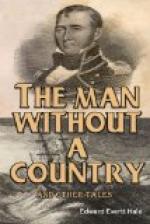But one instance told in detail is better than a thousand told in general, for the illustration of a principle. So I will detain you no longer from the history of what Fausta and I call
THE CRISIS.
CHAPTER IV.
THE CRISIS.
I was at work as a veneerer in a piano-forte factory at Attica, when some tariff or other was passed or repealed; there came a great financial explosion, and our boss, among the rest, failed. He owed us all six months’ wages, and we were all very poor and very blue. Jonathan Whittemore—a real good fellow, who used to cover the hammers with leather—came to me the day the shop was closed, and told me he was going to take the chance to go to Europe. He was going to the Musical Conservatory at Leipsic, if he could. He would work his passage out as a stoker. He would wash himself for three or four days at Bremen, and then get work, if he could, with Voightlander or Von Hammer till he could enter the Conservatory. By way of preparation for this he wanted me to sell him my Adler’s German Dictionary.
“I’ve nothing to give you for it, Felix, but this foolish thing,—it is one of Burrham’s tickets,—which I bought in a frolic the night of our sleigh-ride. I’ll transfer it to you.”
I told Jonathan he might have the dictionary and welcome. He was doing a sensible thing, and he would use it twenty times as much as I should. As for the ticket, he had better keep it. I did not want it. But I saw he would feel better if I took it,—so he indorsed it to me.
Now the reader must know that this Burrham was a man who had got hold of one corner of the idea of what the Public could do for its children. He had found out that there were a thousand people who would be glad to make the tour of the mountains and the lakes every summer if they could do it for half-price. He found out that the railroad companies were glad enough to put the price down if they could be sure of the thousand people. He mediated between the two, and so “cheap excursions” came into being. They are one of the gifts the Public gives its children. Rising from step to step, Burrham had, just before the great financial crisis, conceived the idea of a great cheap combination, in which everybody was to receive a magazine for a year and a cyclopaedia,




